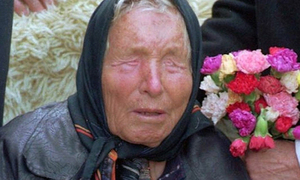Yet that very disengagement weakened the European democracies’ common front. Both European appeasement and American isolationism only encouraged the new Axis Powers to become even more determined to reverse the outcome of World War I.
World War I broke out in 1914 at an age when new offensive technology ? machine guns, airplanes, poison gas, mass-produced artillery shrapnel shells, submarines ? had vastly outpaced the arts of defense and medical care. It proved far easier to kill than to protect soldiers. And it was the first major war that was truly global, spreading beyond Europe to areas of the Middle East and Africa.
What can Americans learn 100 years later from the belated entry of the United States into World War I, and from the war’s beginning, conduct and aftermath?
Isolationism and disarmament only encourage aggressors to do something stupid. Military power and deterrence persuade them not to try.
Had the United States been fully armed in 1914 (or again in 1939) and ready to help its allies, Germany might not have invaded Western Europe, or at least not have achieved such initial successes.
Defeat and occupation force an enemy to cease its aggression. Armistices without a definite result only lead to postponements ? and eventually more war.
World War I’s terrible irony is that today its horrible carnage seems even more senseless than the far-greater death toll of World War II, which ended quite differently and did not lead to another world war.
침공을 부추기는 유화주의와 무장해제
빅터 데이비스 핸슨(후버연구소 역사학자)
제1차 세계대전은 지속적인 평화를 실현하지 못한 것으로 보였다. 미국은 1930년대의 불황기 동안 과거의 고립주의로 되돌아가 무장을 해제하고 유럽의 허무한 전쟁에 다시는 개입하지 않겠다고 단단히 결심했다.
그러나 바로 그러한 미국의 철수가 유럽 민주주의 국가들의 공동전선을 약화시켰다. 유럽의 유화정책과 미국의 고립주의는 모두 새로운 추축 강대국들이 1차대전의 결과를 뒤집겠다는 결의를 더욱 다지도록 부추겼을 뿐이다.
기관총, 비행기, 독가스, 대량생산된 파편 포탄, 잠수함 등 새로운 공격기술이 방어 및 의학 치료기술을 엄청나게 앞질렀던 시기인 1914년에 제1차 세계대전이 발발했다. 병사들을 보호하는 것보다 살해하는 것이 훨씬 쉬운 것이 입증되었다. 또한 1차대전은 유럽을 넘어 중동과 아프리카로 확산된 진정한 최초의 세계적인 대전이었다.
100년이 지나서 미국은 뒤늦은 1차대전 참전과 이 전쟁의 개시, 수행, 결과로부터 무엇을 배울 수 있을까.
고립주의와 무장해제는 침략자들이 어리석은 행위를 하도록 부추겼을 뿐이다. 침략자들이 어리석은 짓을 시도하지 않도록 설득하는 것은 군사력과 억지력이다.
미국이 1914년에(혹은 1939년에 다시) 완전히 무장하고 동맹국들을 도울 태세를 갖추고 있었다면 독일은 서유럽을 침공하지 않았거나 혹은 적어도 그러한 초기의 성공을 거두지 못했을 가능성이 있다.
패배시키는 것과 점령하는 것이 적의 침공을 강제로 중단시킨다. 명확한 결과가 없는 휴전은 지연만 유도할 뿐 결국 더 많은 전쟁으로 이어진다.
1차대전의 참혹한 대학살이 사망자 수가 훨씬 많은 2차대전보다 오늘날 더 무의미해 보이는 것은 1차대전의 끔찍한 역설이다. 2차대전은 매우 다르게 끝이 났고 또 다른 전쟁으로 이어지지 않았다.
역주=오성환 외신전문위원 suhwo@segye.com
△isolationism:고립주의 △nihilistic:허무주의의 △disengagement:철수, 분리, 이탈
빅터 데이비스 핸슨(후버연구소 역사학자)
제1차 세계대전은 지속적인 평화를 실현하지 못한 것으로 보였다. 미국은 1930년대의 불황기 동안 과거의 고립주의로 되돌아가 무장을 해제하고 유럽의 허무한 전쟁에 다시는 개입하지 않겠다고 단단히 결심했다.
그러나 바로 그러한 미국의 철수가 유럽 민주주의 국가들의 공동전선을 약화시켰다. 유럽의 유화정책과 미국의 고립주의는 모두 새로운 추축 강대국들이 1차대전의 결과를 뒤집겠다는 결의를 더욱 다지도록 부추겼을 뿐이다.
기관총, 비행기, 독가스, 대량생산된 파편 포탄, 잠수함 등 새로운 공격기술이 방어 및 의학 치료기술을 엄청나게 앞질렀던 시기인 1914년에 제1차 세계대전이 발발했다. 병사들을 보호하는 것보다 살해하는 것이 훨씬 쉬운 것이 입증되었다. 또한 1차대전은 유럽을 넘어 중동과 아프리카로 확산된 진정한 최초의 세계적인 대전이었다.
100년이 지나서 미국은 뒤늦은 1차대전 참전과 이 전쟁의 개시, 수행, 결과로부터 무엇을 배울 수 있을까.
고립주의와 무장해제는 침략자들이 어리석은 행위를 하도록 부추겼을 뿐이다. 침략자들이 어리석은 짓을 시도하지 않도록 설득하는 것은 군사력과 억지력이다.
미국이 1914년에(혹은 1939년에 다시) 완전히 무장하고 동맹국들을 도울 태세를 갖추고 있었다면 독일은 서유럽을 침공하지 않았거나 혹은 적어도 그러한 초기의 성공을 거두지 못했을 가능성이 있다.
패배시키는 것과 점령하는 것이 적의 침공을 강제로 중단시킨다. 명확한 결과가 없는 휴전은 지연만 유도할 뿐 결국 더 많은 전쟁으로 이어진다.
1차대전의 참혹한 대학살이 사망자 수가 훨씬 많은 2차대전보다 오늘날 더 무의미해 보이는 것은 1차대전의 끔찍한 역설이다. 2차대전은 매우 다르게 끝이 났고 또 다른 전쟁으로 이어지지 않았다.
역주=오성환 외신전문위원 suhwo@segye.com
△isolationism:고립주의 △nihilistic:허무주의의 △disengagement:철수, 분리, 이탈
Copyright ⓒ 세계일보. 무단 전재 및 재배포 금지
![[설왕설래] 아파치 공격헬기 철수](http://img.segye.com/content/image/2026/01/04/128/20260104510004.jpg
)
![[특파원리포트] 한한령은 ‘해제’되지 않는다](http://img.segye.com/content/image/2026/01/04/128/20260104509996.jpg
)
![[구정우칼럼] 쿠팡은 왜 한국인의 신뢰를 잃었나](http://img.segye.com/content/image/2026/01/04/128/20260104509992.jpg
)
![[김정기의호모커뮤니쿠스] 소통 유연성](http://img.segye.com/content/image/2026/01/04/128/20260104509987.jpg
)








